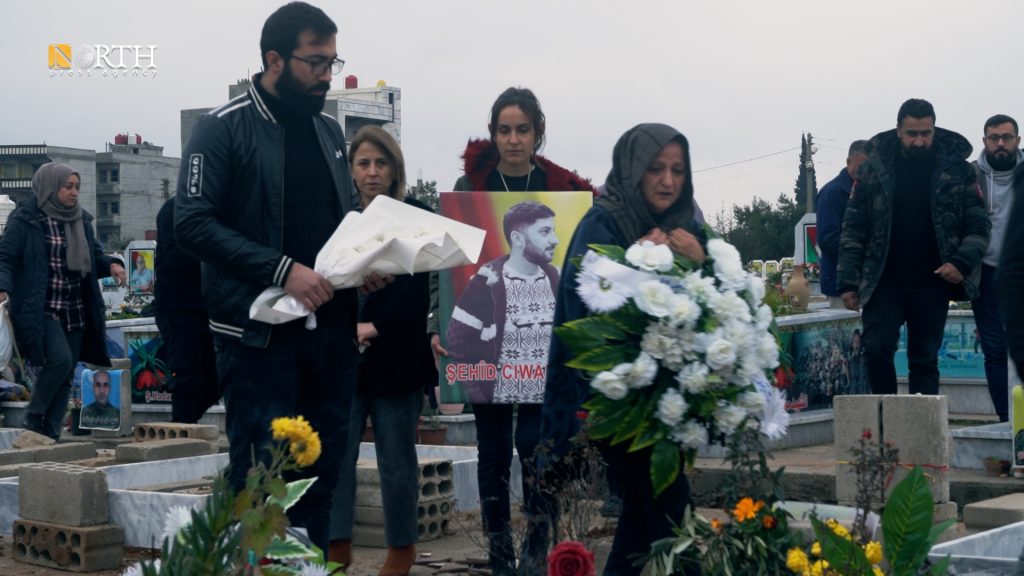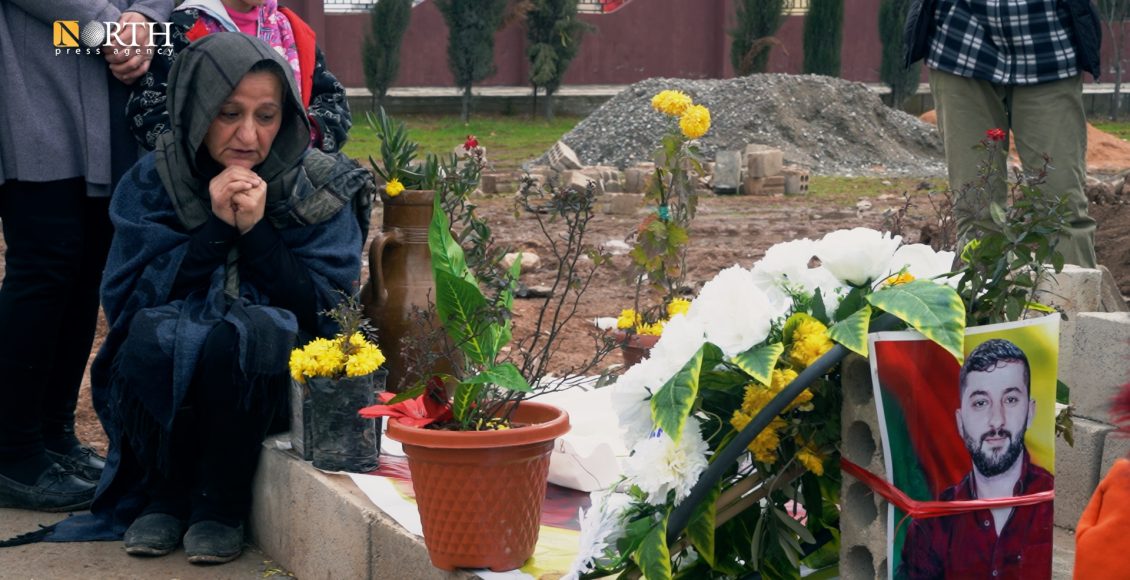Turkish airstrikes on NE Syria kill backbone of family from Afrin
By Avin Youssef
QAMISHLI, Syria (North Press) – Jwan Ali’s family is still trying to cope after his death in a Turkish drone strike over a month ago in the city of Qamishli, northeastern Syria.
Jwan hailed from the city of Afrin, northwestern Syria. He was displaced with his family after Turkey and its affiliated armed opposition factions, aka the Syrian National Army (SNA) occupied Afrin Region in 2018.
On Dec. 25, 2023, Turkish drone strikes on Simav printing house led to the killing of seven civilians, including Jwan and five workers at the printing house.
Simav printing house was founded in Qamishli after 2011. The printing house printed books, local newspapers, magazines, and sales receipts.
Jwan was the second son in the family and lived in Afrin with two brothers and an older sister.
Ali studied until middle school, but circumstances did not allow him to complete his education. In 2014, Jwan, only 14-years-old at the time, was forced to go with his older brother to Turkey to work.
The two brothers worked in a fishery to earn a steady income to help them start a business and pay off debts they had after building the family’s house in Afrin.
However, Jwan’s love for his family and his determination to return to Afrin every few months to see his mother prompted him to stay in Afrin in 2016.
His mother, Sherin Ma’mo, told North Press that he was a cheerful person and smiled all the time. No matter how tired or upset he was in his work and life, he had a sense of humor and joked with his family, she added.
After several months, his brother returned as well. They opened a small shop in Afrin for electrical and water installation supplies.
The shop was small but covered the family’s expenses, which allowed them to enjoy a relatively stable life.
However, Turkey’s occupation of Afrin in 2018 forced the family to flee to the village of Fafin in the north of Aleppo, northwestern Syria. Shortly after, Jwan along with his mother and younger brother Mirvan headed to Qamishli.
Hopes and Challenges
The family faced challenges of starting over a new life in Qamishli. They stayed with one of their acquaintances for a month before being able to rent a house.
Some relatives abroad and Jwan’s friends helped the family buy household items but the family faced a lot of difficulties during that time, according to Ma’mo.
Jwan started working in a sewing workshop in Qamishli in 2019, where he met his wife, Rawan Qasem, who worked there with her brother and sister.
Later, Jwan got a job opportunity as a driver in a fuel company affiliated with the Autonomous Administration of North and East Syria (AANES).
Jwan was protective of his younger brother and very affectionate towards his mother. He would kiss and hug her every morning before leaving to work.
His colleagues at work attested that the young man possessed the wisdom of a fifty-year-old man.
His mother recalls how he used to be happy when she woke him up in the morning. “He told me when I was absent, he would wake up by himself without an alarm clock, but when I was beside him, he would sleep comfortably,” the mother said.
The mother was overjoyed when her son got married and thought it would bring him stability and happiness after facing so much hardships.
The family had dreams and hopes of a better future after Jwan had two children.
Rawan, Jwan’s wife, said that he found joy in taking care of the needs of each family member. He dealt with everyone with a cheerful spirit to make them happy.
Jwan Ali’s family in Qamishli city, northeastern Syria – North Press
Turkish Attacks
The day of the attacks was Christmas Day. It is an official holiday but some institutions continue to operate, including the AANES’ Fuel Directorate and Simav printing house.
On that day, the mother woke her son up, lit the heating stove and made tea.
She said he was excessively affectionate that morning when he said goodbye. When she followed him to the street, he asked her to go back inside because the weather was cold outside.
When Ali Hisso, Jwan’s friend, arrived to work, he did not see Jwan, who would usually tease him for being late or neglecting to wash his car. He saw Jwan’s cellphone in the charger in his office.
An hour later, the family heard loud sounds of explosions. When Jwan’s mother did not get a response from her son, she texted his friend, “Ali, Jwan is not answering me.”
The family grew more fearful as the airstrikes became frequent. Meanwhile, Mirvan, 14, told his mother and his brother’s wife not to scare the children with their crying.
One of the airstrikes hit the vicinity of the fuel company, prompting the workers to leave their offices. Jwan called Ali to check on them. “Be careful, and take my phone with you. I am busy with some work right now,” Jwan told Ali.
By midday, Ali called Ma’mo and told her he had Jwan’s cellphone and that he was not at the company when the Turkish airstrikes targeted its vicinity.
But Ali knew that Jwan and his other colleague Farhan were at the printing house that was hit earlier.
Ali called the hospital and a doctor informed him that Farhan had died, but he had no information about Jwan. Later, they found out Jwan was indeed injured and was in the hospital.
Hope faded
Ali told Ma’mo that Jwan was in the hospital and had minor wounds so that she would not be scared and shocked.
The family cried and prayed for Jwan and headed to the hospital, which was crowded with relatives of victims and members of the Internal Security Forces of North and East Syria (Asayish).
No one was allowed to see the patients but the mother stayed there until late at night, and relatives gathered outside the hospital. She returned home to receive guests who came to check on Jwan.
On the next day, the hospital allowed Jwan’s mother and wife to see him remotely through a screen.
Ma’mo said she was willing to endure, whispering in her prayers that she would wait for him for weeks and months while he was in coma, as long as he recovered.
She became hopeful after three days of his injury, wishing he was no longer in a critical condition.
On Dec. 29, 2023, two men came to the family’s house, at that moment she knew they had come to let her know Jwan had died.
Jwan’s chivalry
Turkey claimed responsibility for the attack on the printing house by releasing footage that said they took maximum caution to prevent civilian casualties and damage to civilian objects during the operations.
Anyone who knew him would not forget that he was a chivalrous man,” Ali said.
Ali recalled that whenever Jwan received his salary, he would happily plan how to buy something for his son or put money aside so that his brother could attend a vocational training or an English language course. He had a dream that his family would be successful and happy in their lives.

Jwan’s mother refuses to move to the northern countryside of Aleppo as her relatives requested. She prefers to stay in Qamishli to visit her son’s grave and take care of her son Mirvan and the family.
She believes that Jwan was thinking of his family up until the moment he was injured. This pushes her to continue living and taking care of the family.



